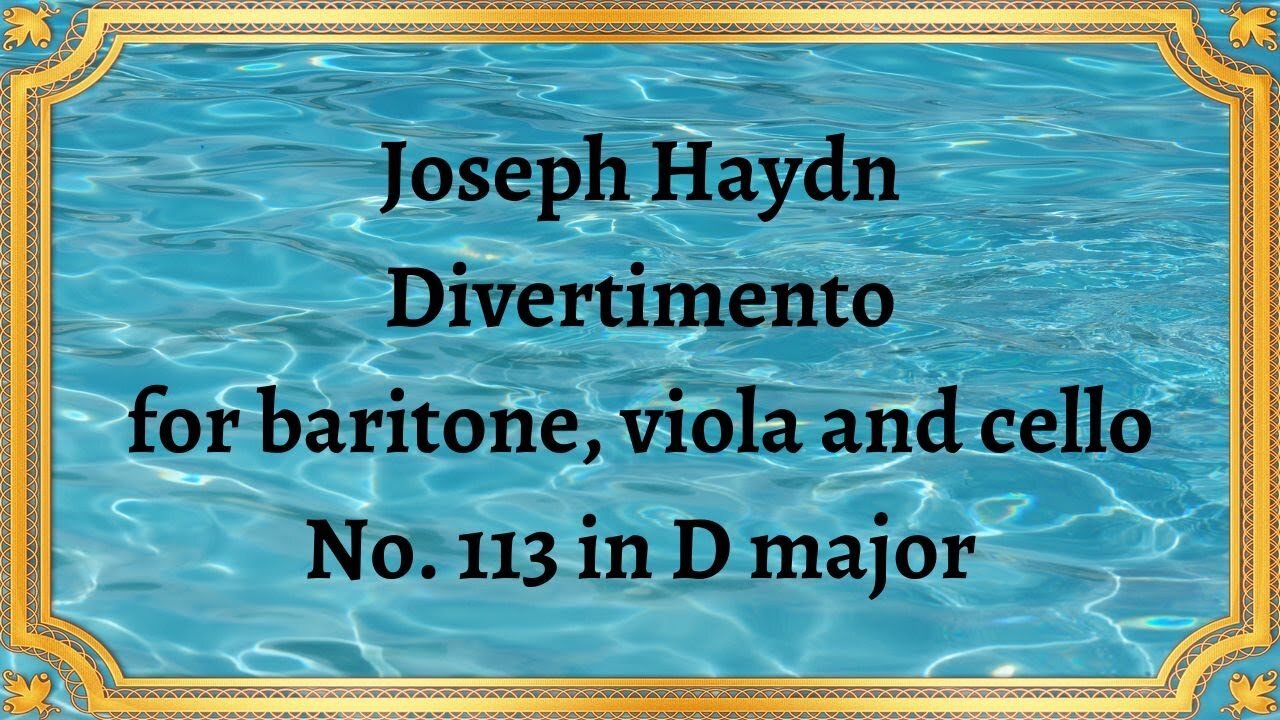Premium Only Content

Joseph Haydn Divertimento for baritone, viola and cello No. 113 in D major
#JosephHaydn #Divertimento #Baritone #Viola #Cello #Dmajor #chambermusic #Adagio #Menuetto #Presto #classicalmusic #instrumentation #musiccomposition
Haydn's music is characterized by his unique and innovative approach to composition, and his Divertimento for Baritone, Viola, and Cello No. 113 in D major is no exception. This composition is a prime example of how Haydn expertly crafted music that was both entertaining and intellectually complex.
Joseph Haydn composed the Divertimento in D major in 1765, and it's one of his earlier works in the chamber music genre. This composition is also known as Baryton Trio No. 113 as it features the baryton, a unique stringed instrument that was popular during the 17th and 18th centuries. The baryton has a set of strings which are plucked by the player's left-hand while bowing the main part. The Divertimento for Baritone, Viola, and Cello No. 113 in D major is one of Haydn's lesser-known trios, but it is no less charming than his more famous works.
The first movement of the trio is marked as Adagio, which is a slow and thoughtful-paced music piece. The baritone takes the lead, playing a lyrical melody intermingled with the accompaniment by the viola and the cello. This creates an enchanting soundscape that highlights the unique tonal qualities of the strings. The second movement, marked as Menuetto, is a livelier composition featuring a ¾ time signature and a playful melody. The third and final movement is marked as Presto and is the most technically challenging movement of the composition. It features a rapid, lively, and technical passage, which showcases the virtuosity of the performers.
The Divertimento for Baritone, Viola, and Cello No. 113 in D major is a beautifully crafted composition that showcases some of the best qualities of Haydn's music style. The piece is notable for its intricate melodies, complex rhythms, and stunning interplay between the instruments. The composer's ability to write for the baryton within an ensemble setting is quite impressive. The composition is not only entertaining but provides a valuable insight into the composer's ability to craft music in a way that resonates with audiences from all walks of life.
In conclusion, Joseph Haydn's Divertimento for Baritone, Viola, and Cello No. 113 in D major is a masterful composition that highlights the unique qualities of his music style. The piece is a delightful example of chamber music and is marked by its intricate melodies.
You have the opportunity to support the channel https://destream.net/live/RadSiarAl/donate
-
 1:00:27
1:00:27
Trumpet Daily
19 hours ago $3.05 earnedThe Spirit of Compromise - Trumpet Daily LIVE | July 15, 2025
2.15K2 -
 LIVE
LIVE
BEK TV
22 hours agoTrent Loos in the Morning 7/16/2025
247 watching -
 10:17
10:17
Dr Disrespect
19 hours agoIt's Time To Get Serious
72.1K12 -
 3:39:10
3:39:10
"What Is Money?" Show
4 days agoBitcoin and the Mystery of Money w/ Robert Breedlove
19.6K -
 12:57
12:57
Zoufry
20 hours ago $1.34 earnedThe Car Theft Epidemic in America
29.8K5 -
 9:05
9:05
MattMorseTV
16 hours ago $4.72 earnedThis changes EVERYTHING.
89K41 -
 2:20:23
2:20:23
Side Scrollers Podcast
20 hours agoElon Musk Creates GOONING AI, DSP Lawsuit?, Disney Adults Hit NEW LOW | Side Scrollers Live
42.4K7 -
 1:58:04
1:58:04
FreshandFit
9 hours agoWhy Women Are Always Single?
211K33 -
 1:12:39
1:12:39
Man in America
17 hours agoThe Frightening Truth About Weather Warfare & Depopulation w/ Kim Bright
128K63 -
 2:59:21
2:59:21
TimcastIRL
11 hours agoTrump Calls Epstein Case A HOAX By Democrats, GOP Votes TO BLOCK Release | Timcast IRL
272K315